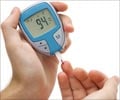New research adds more evidence to the link between sleep problems and diabetes.

The research will be presented at the ATS 2012 International Conference in San Francisco.
The study involved 7,886 prospectively assessed subjects from 22 sleep laboratories in 16 European countries. All subjects completed overnight sleep studies.
After adjustment for comorbidities and demographic and anthropometric variables, moderate and severe OSAS were each significant (P=.003) predictors of having a diagnosis of T2DM. Apnea/hypopnea index, oxyhemoglobin desaturation index, and mean oxygen saturation (SpO2) were significant (P<.0001) predictors of HbA1c levels.
"A diagnosis of T2DM is associated with a significantly increased risk of cardiovascular morbidity and death, and elevated HbA1c levels predict cardiovascular mortality in non-diabetic subjects," said Dr. Kent. "OSAS has also been shown to be associated with adverse cardio-metabolic outcomes, although whether OSAS independently predicts these outcomes is not clear."
"Our study shows that OSAS is independently associated with metabolic disturbances," said Dr. Kent. "This is important because individuals with T2DM or elevated HbA1c levels are more likely to die of cardiovascular disease."
Advertisement
Source-Eurekalert















